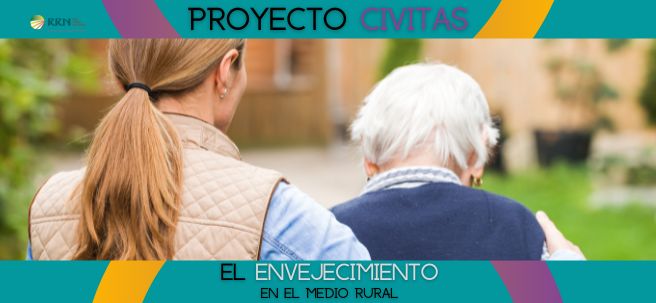
28 de September de 2021
Loneliness, the lack of quality public healthcare, and the deficiencies in care and assistance services are identified as the main problems facing older adults living in rural municipalities in the Campos and Torozos region of Castile and León.
- The "Collective for Rural Development of Tierra de Campos" (Castilla y León) has conducted a study for 2 years with 300 elderly people in its territory
- The study was part of the LEADER approach of the Rural Development Program of Castilla y León
This is the conclusion of a study conducted from 2019 to 2021 by the " Collective for Rural Development of Tierra de Campos" (Castilla y León). Named 'CIVITAS: Community Support in Campos and Torozos' , it was a social innovation project whose objective was to combine the needs of older adults in rural areas with those of unemployed people in the area who showed interest in employment in the field of social and healthcare.
More than 300 people , aged between 60 and 97, from the 22 municipalities that make up the Campos and Torozos region, participated in the study conducted by the Tierra de Campos Collective.
There are several key insights that have emerged from the study, but one main point stands out: depopulation in Campos and Torozos exacerbates the problems associated with aging.
Conclusions
From the responses given by the participants, the following conclusions can be drawn:
1) The health crisis caused by COVID-19 has led to a change in the relationships of older people, which has increased their feeling of loneliness .
2) Citizen participation remains a pending task, as the majority of those surveyed do not participate in elder care in their locality.
3) The elderly population shows no interest in using information and communication technologies (ICTs). This lack of training poses a problem for accessing various public services through applications.
4) Discontent with basic health services is widespread.
5) Care and attention for the elderly: older adults express mixed feelings: on the one hand, they desire and rely on family support, and on the other, they don't want to be a burden. Above all, they express that leaving their homes is their last option, something made more difficult by the lack of care services.
6) The family remains the primary institution responsible for caring for the elderly.
7) Senior residences remain a last resort, although many people request this service for their towns as an alternative to leaving the municipality.
Javier Paniagua, manager of the Tierra de Campos Local Action Group (GAL), tells RRN: “Loneliness, the lack of quality public healthcare, and the deficiencies in care and assistance services have been identified as the main problems facing older adults living in the municipalities that make up the Campos and Torozos region.”
LEADER Approach
CIVITAS was a project based on a participatory or bottom-up approach—one of the fundamental principles of the LEADER methodology —which encourages participation in the rural development of territories by involving local communities, as they are the greatest experts in their own areas.
CIVITAS was part of the LEADER Strategy "Campos y Torozos 2020" and was developed within the framework of Measure 19.2 (LEADER) of the Castilla y León Rural Development Program. With a budget of €50,000, it was co-financed by the European Agricultural Fund for Rural Development (EAFRD), the Regional Government of Castilla y León, and the Ministry of Agriculture, Fisheries, and Food.











